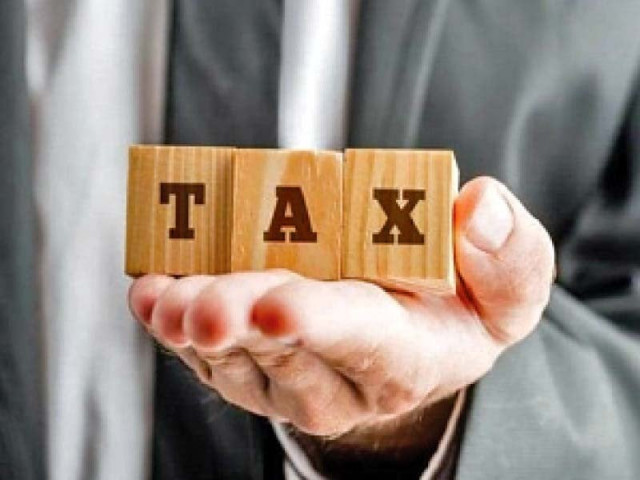IMF proposes high income tax
It will put more burden on salaried class already reeling from double-digit inflation

The International Monetary Fund (IMF) has proposed to tax the upper middle and rich income groups, who earn in the range of Rs104,000 to Rs1 million a month, at a single rate of 30%.
The proposal indicates inequity in taxation as a majority of the salaried Pakistanis will be worse off amid double-digit inflation in the country.
The IMF’s proposal also seems to be unjustified that equate a person earning Rs100,000 with the one who has 10 times more income and can afford to pay 30%, or Rs300,000, every month in taxes.
But Pakistan has not yet accepted the IMF’s proposal due to its adverse political, economic and social impact, sources in the Federal Board of Revenue (FBR) told The Express Tribune.
The new rate proposed by the IMF would result in an additional revenue of Rs96 billion, bringing total taxes from individuals to around Rs220 billion.
Sources said that in addition to the disagreement over the salaried class taxation, both sides also could not converge on the issue of taxing the pensioners.
The IMF is insisting that pensions should be taxed, either at the contribution stage or at the withdrawal stage.
About 1.24 million salaried people have filed income tax returns for tax year 2021 and out of these 333,000 fall in the income tax exemption slab of Rs50,000 per month.
The government has shared its revised tax slabs for the individuals – both salaried and business income – with the IMF, which are higher than the existing rates, but do not put a major burden on the middle and upper-middle income groups.
The IMF proposed that the tax rate for people earning in the range of Rs50,000 to Rs62,500 a month should be 5% – a rate that is currently being levied on people earning up to Rs100,000 a month, sources said.
For the middle income group having monthly income of up to Rs79,000, the IMF has proposed 10% income tax rate, which is currently charged to only those who earn Rs150,000 a month.
It has come up with the proposal to slap 20% tax on the monthly income below Rs104,000, according to the sources.
The 20% tax rate is currently charged from the people earning nearly Rs417,000, indicating a massive increase in the tax burden on the middle income groups.
Inflation in Pakistan stood at 12.3% last month, which is the highest in South Asia and one of the highest in the world.
The IMF’s most aggressive proposal was to slap a single tax rate of 30% on people having monthly income above Rs104,000 to Rs1 million, said the sources. These people are estimated to cough up Rs160 billion for the FBR.
The proposal is unjustified and unfair and cannot be accepted, according to a person familiar with the outcome of the talks that remained inconclusive.
A person earning Rs100,000 a month cannot afford to give away Rs30,000 when prices of everything are skyrocketing. The proposal will hit the majority of the people who file income tax returns and pay taxes.
The 2019 Household Integrated Economic Survey (HIES) revealed that among total households in Pakistan, households of the richest quintile are having the average income almost three times as compared to the lowest quintile of households in urban and rural areas.
The gap between the lowest and highest quintiles is more pronounced in urban areas, according to the PBS survey.
Currently, the 30% tax rate is collected from those who earn Rs4.1 million a month – the ultra-rich class.
For people earning over Rs1 million a month, the IMF has proposed 35% income tax but it will hardly affect 6,000 individuals. The total tax from these people is estimated at around Rs45 billion, said the sources.
Compared to these rates, the sources said, the government proposed that for people earning up to Rs100,000 a month, the tax rate should be 10%, which seems reasonable but higher than the existing rate.
For those who earn over Rs100,000 to Rs333,000 a month, the FBR has suggested 15% income tax, which also seems affordable, though this rate is currently being imposed on those who earn over Rs208,000 a month.
Read: We have satisfied IMF on $1.5b subsidy: Tarin
The FBR has proposed that the tax rate for those earning up to Rs666,000 should be 20%. According to the FBR recommendation, the tax rate for people earning up to Rs1.25 million a month should be 30%.
It has recommended a 32.5% tax rate for those earning Rs2.5 million a month and 35% for the ones having monthly income of above Rs2.5 million.
Currently, the 35% rate is collected from those who earn over Rs6.25 million a month.
Pakistan and IMF talks have hit a dead end after the Fund refused to accept the government’s decisions to give a blanket tax amnesty to industrialists and give Rs246 billion relief package.
However, the Ministry of Finance claimed that “negotiations under the seventh review are continuing as planned and the two sides remain engaged on a regular basis at a technical level through virtual meetings and data sharing”.
Published in The Express Tribune, March 25th, 2022.
Like Business on Facebook, follow @TribuneBiz on Twitter to stay informed and join in the conversation.



















COMMENTS
Comments are moderated and generally will be posted if they are on-topic and not abusive.
For more information, please see our Comments FAQ